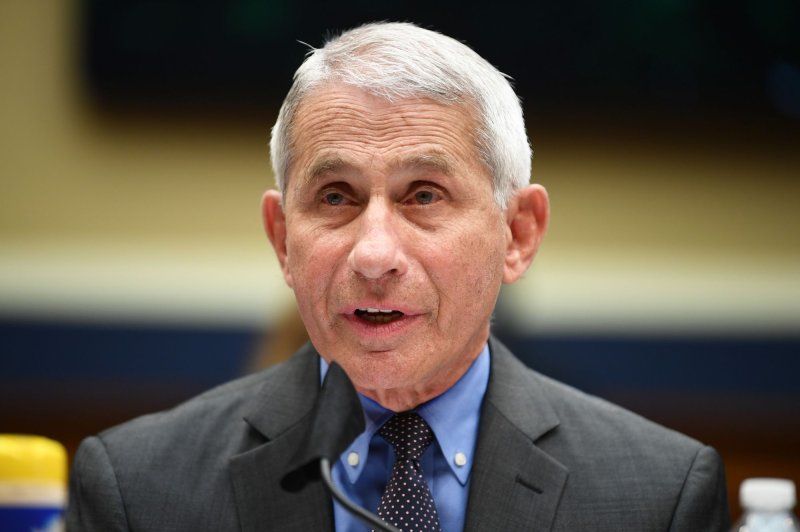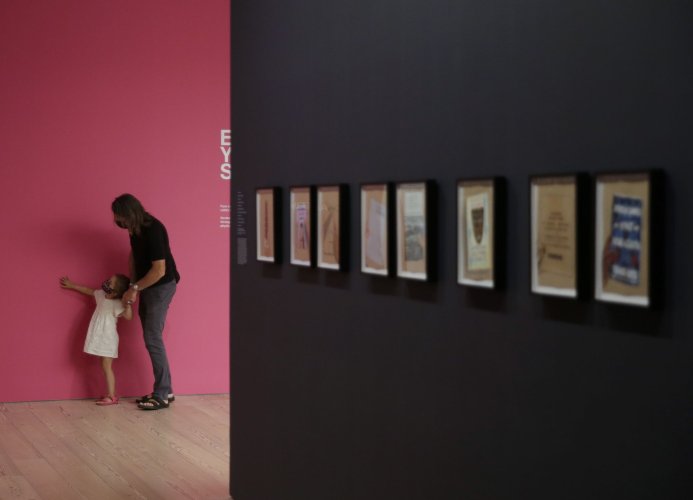1 of 3 | Director of the National Institute for Allergy and Infectious Diseases Dr. Anthony Fauci testifies Tuesday before the House Committee on Energy and Commerce on the Trump Administration's Response to the COVID-19 Pandemic. Photo by Kevin Dietsch/UPI |
License Photo
June 23 (UPI) -- Dr. Anthony Fauci told a House panel Tuesday that he has never been asked to slow down testing for COVID-19 and again expressed hope that a vaccine will be ready by the end of 2020 or early 2021.
Asked about statements by President Donald Trump at a campaign rally Saturday that he had asked for a slowdown in testing, Fauci, director of the National Institute for Allergy and Infectious Diseases, said that neither he nor any other top U.S. health official has been asked to do so.
"To my knowledge, none of us have ever been told to slow down on testing. That just is a fact," he told members the House energy and commerce committee. "In fact, we will be doing more testing."
The president drew criticism when he suggested spikes in coronavirus cases in several states were due to increased testing.
"Here's the bad part: When you do testing to that extent, you're going to find more people, you're going to find more cases," Trump said. "So I said to my people, 'Slow the testing down, please.'"
Other members of the White House Coronavirus Task Force -- including Food and Drug Administration Commissioner Stephen Hahn, Centers for Disease Control and Prevention Director Robert Redfield, and Health and Human Services Assistant Secretary Brett Giroir -- each answered "no" when similarly asked if they had been instructed to slow down COVID-19 testing.
Fauci, one of the leading experts for the government since the health crisis began, testified last month before the Senate health committee and expressed concern about states reopening before there were documented declines in cases. A number of other officials and experts have warned against reopening too much too soon.
Tuesday, he said he remained "cautiously optimistic" about the progress toward developing a vaccine for COVID-19, announcing that one vaccine trial was set to enter a large-scale Phase 3 study in July.
"There will be others that follow one month, two months, three months later," he said. "Although you can never guarantee at all the safety and efficacy of a vaccine until you actually test it in the field, we feel cautiously optimistic ... we will able to make them available to the American public within a year of when we started."
That would put the timeline at late this year or early in 2021, he said, reiterating an opinion he first made in front of the same committee in April.
The hearing, titled, "Oversight of the Trump Administration's Response to the COVID-19 Pandemic," began with an opening statement from committee chairman Rep. Frank Pallone, D-N.J., in which he cited "a lot of unfortunate missteps in the Trump administration's response to the COVID-19 pandemic."
The United States has so far reported more than 2.3 million cases and 120,600 deaths since the start of the pandemic, according to Johns Hopkins University. Several states, including Florida, Arizona, Texas, California and the Carolinas, have reported a rise in cases in recent weeks after loosening and lifting restrictions.
"While a second major increase of COVID-19 cases, or infections could occur in the fall, experts agree that the United States has not yet recovered or emerged from the first wave," Pallone said in his statement.
On Monday, Pallone and Rep. Diana DeGette of Colorado, chairwoman of the House oversight and investigations subcommittee, sent a letter to Health and Human Services Secretary Alex Azar, U.S. Attorney General William Barr and Homeland Security Acting Secretary Chad Wolf to ask what federal efforts are being taken to ensure front-line workers have adequate medical supplies, personal protective equipment and testing capabilities and how agencies are coordinating efforts to stem the spread of COVID-19.
"We write to express serious concerns regarding reports of healthcare providers and governments at all levels continuing to encounter challenges in reliably procuring vital medical supplies needed to combat COVID-19," Pallone and DeGette wrote in the letter. "We also want to better understand the extent to which the federal government is overseeing and coordinating these procurement activities.
"Healthcare providers and governments at all levels -- which may lack experience in procuring scarce goods in a chaotic global market -- have been forced to compete against each other to secure the supplies they need."
The hearing came as Trump traveled to Arizona to visit a segment of the border wall and give a speech at a Phoenix church as the state reported a record single-day increase in coronavirus cases.
Trump has repeatedly refused to wear a mask or other form of face covering while appearing in public during the pandemic and during the hearing on Tuesday, Fauci said he had never personally directed the president to do so.
Redfield declined to answer a question from Rep. Kathy Castor, D-Fla., about how often he interacts with Trump.
"Well, I have regular interactions as part of the White House task force, as a member," he said. "As it relates to my interactions directly with the president, I'm going to keep those between myself and the president."
The health officials discussed the pandemic's ongoing threat and potential issues that could occur if a sustained increase in COVID-19 occurs at the same time as flu season. On average, between 300,000 and 650,000 people die each year from influenza, according to World Health Organization figures.
"While it remains unclear how long the pandemic will last, COVID-19 activity will likely continue for some time," Fauci said in prepared remarks for Tuesday's hearing. "It is also unclear what impact the ongoing COVID-19 pandemic will have on healthcare and public health systems during the upcoming influenza season.
"If there is COVID-19 and flu activity at the same time, this could place a tremendous burden on the healthcare system."
Visitors wear face masks as they tour the Whitney Museum of American Art as it reopens on September 3. Photo by John Angelillo/UPI |
License Photo
















